I started turkey hunting right around the time that 3 ½-inch 12-gauge loads became a thing. I immediately had to have one. Why? Because no one offered a 4-inch shell and back then, I wanted the biggest, heaviest turkey loads with the highest number of pellets available.
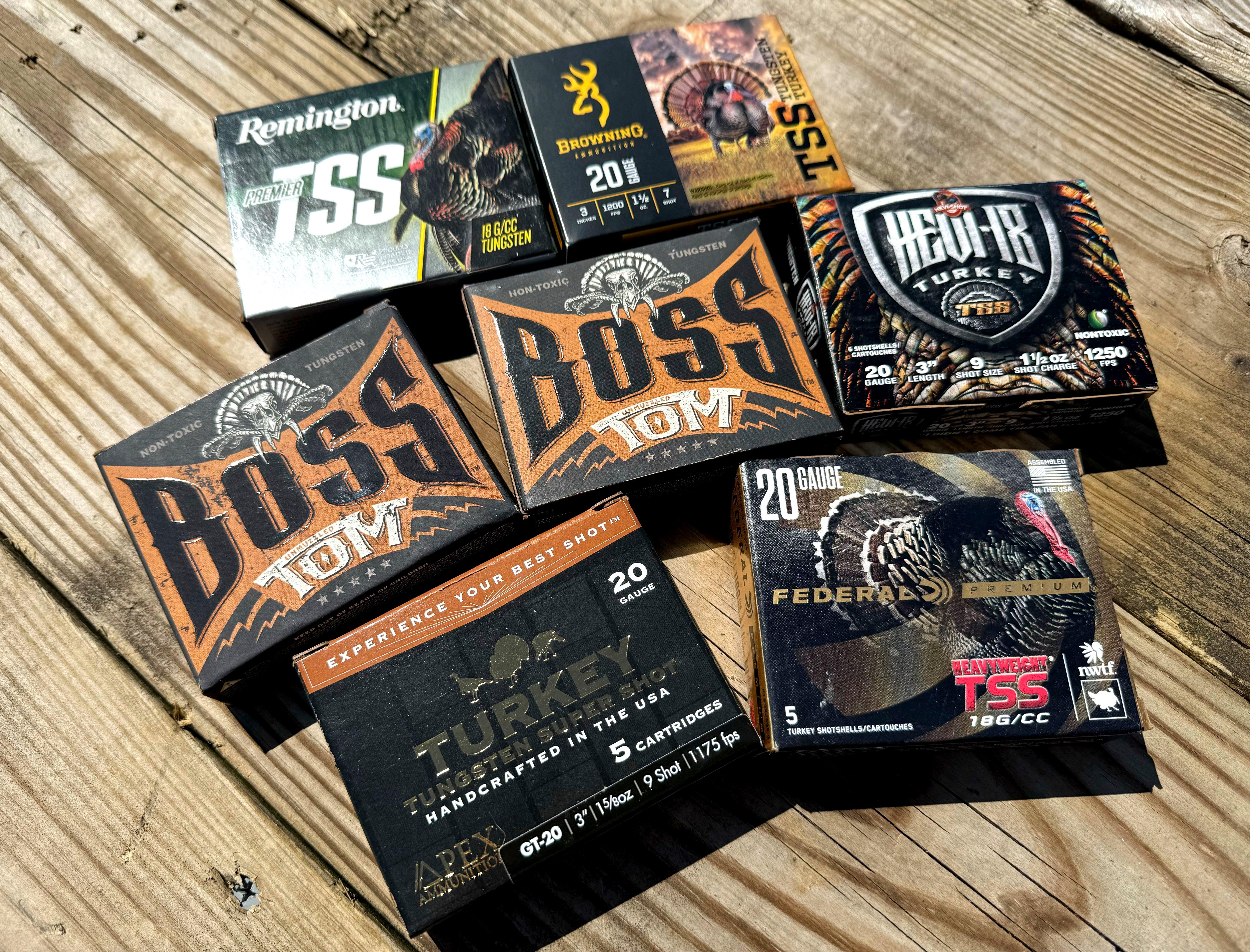
Gone are the days of needing a shoulder punishing 12-gauge for turkeys. These 20-gauge loads will get the job done. Image by Michael Pendley
Even with the extra length, I knew that the maximum range of the best turkey loads of the day was about 35 yards. The big guns were heavy, and they punished a shooter, especially at the practice range. A day of patterning left you with a headache, a sore jaw, and a shoulder bruise that would stick around for a week or two.
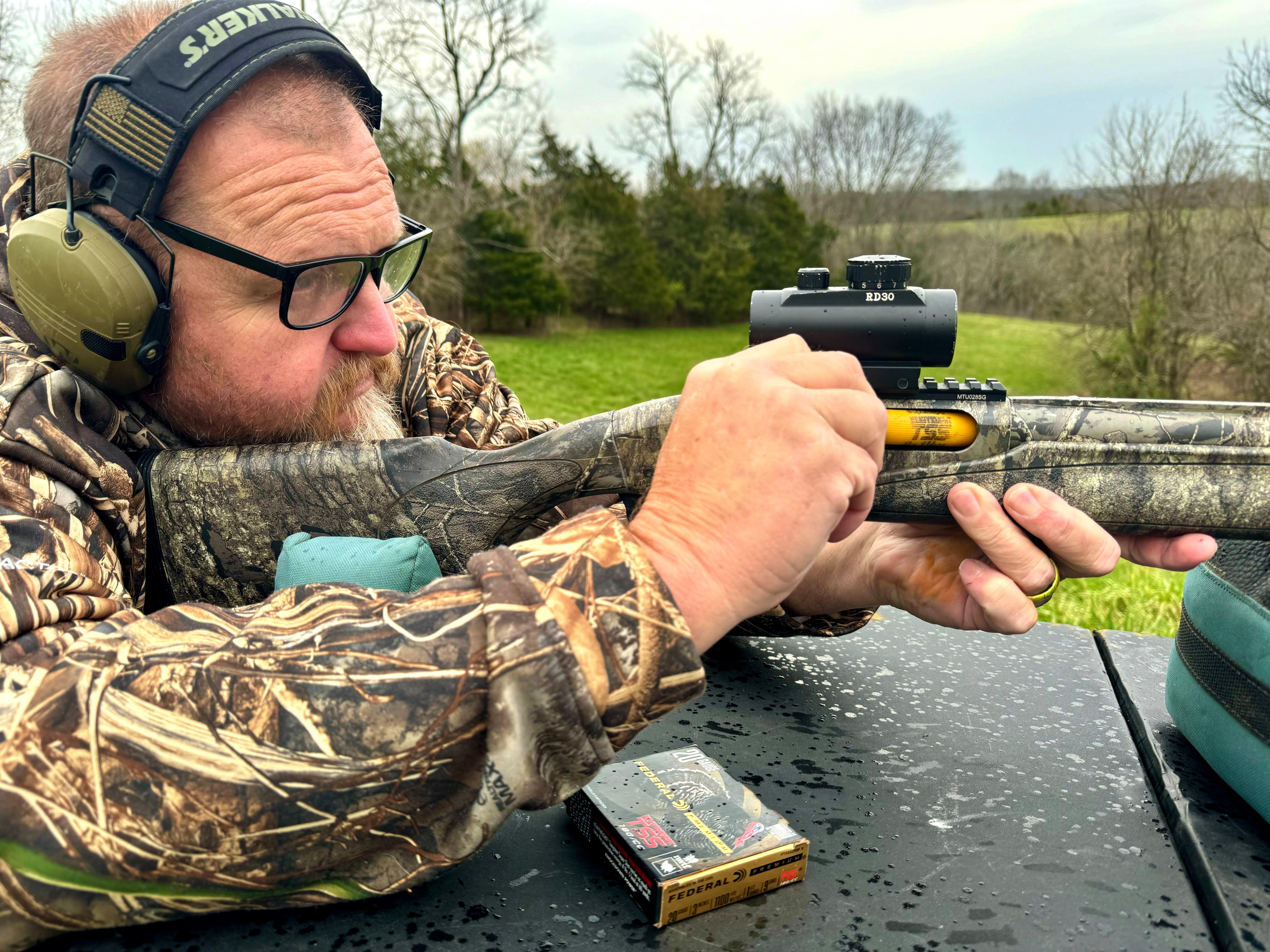
Light weight and softer recoil are just two of the advantages of a 20 gauge when it comes to turkey hunting. Image by Michael Pendley
Fast forward 30 years or so. The invention of Tungsten Super Shot meant that hunters could now shoot much smaller shot sizes like No. 7, 8, 9, and even 10 and still carry as much lethal downrange energy as much larger lead shot. At 18.1 grams per cubic centimeter (g/cc) compared to lead at 11.7 g/cc, a No. 9 TSS pellet hits like a #5 lead pellet. It didn’t take long for hunters and ammo makers to figure out that they could now pack 20-gauge hulls with as many or more shot as was previously loaded into 3 ½-inch 12-gauge lead loads.
The new 20-gauge loads revolutionized sub-gauge turkey hunting. Guns were lighter, recoil was softer, and patterning a turkey gun became a much more pleasant experience. Today, hunters will find a wide range of 20-gauge turkey loads available. We hit the range and tested eight of the most popular ones currently available.
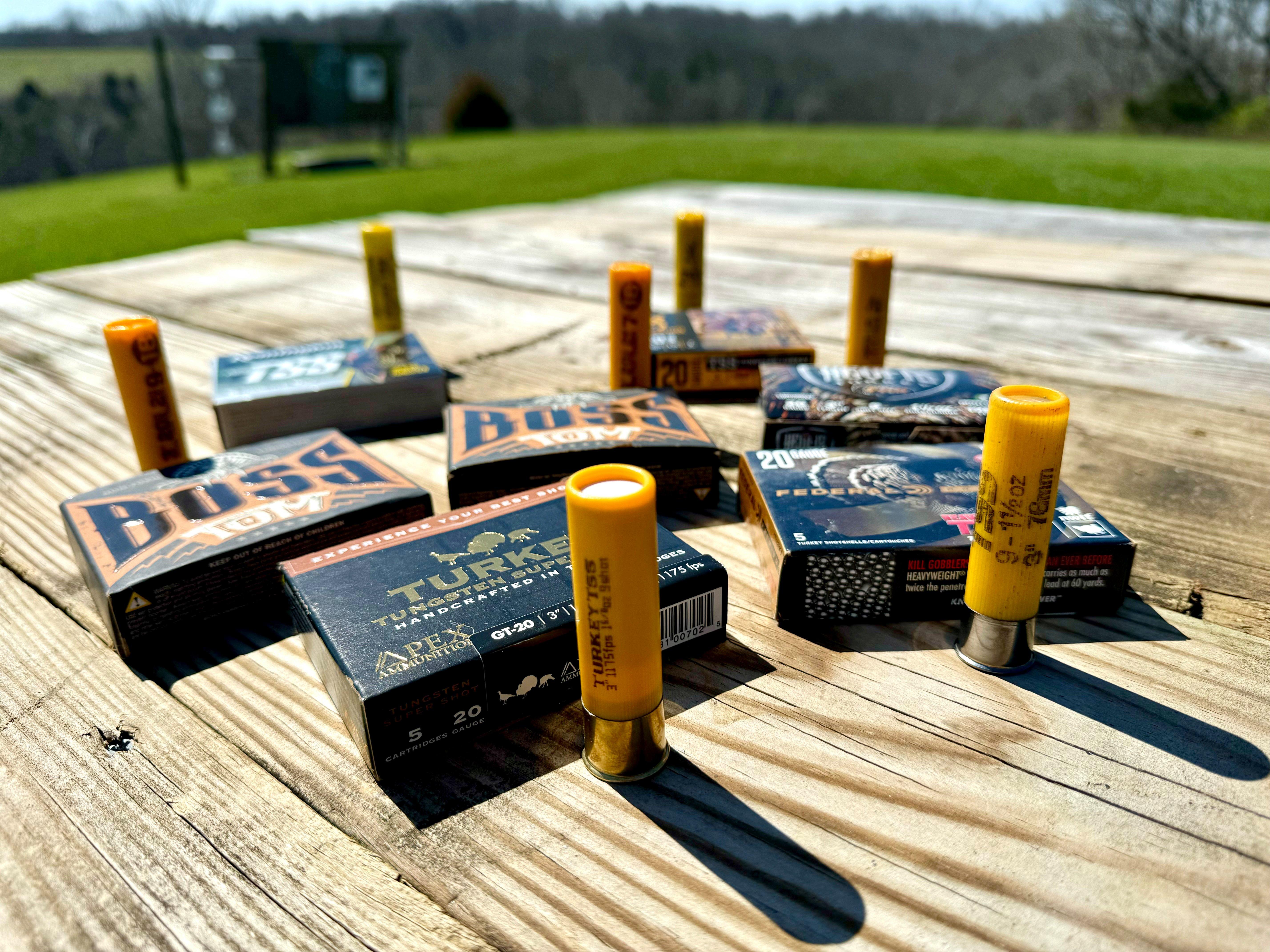
All but one of the tested loads were TSS shot. Image by Michael Pendley
My test gun was my wife’s personal turkey gun. It’s a Remington Compact 870 fitted with a red dot scope and a Carlson’s Heavyweight TSS choke tube in .555 constriction. Over the past few years, it has accounted for a number of turkeys and more than a few curious coyotes that made the mistake of investigating lonesome hen yelps.
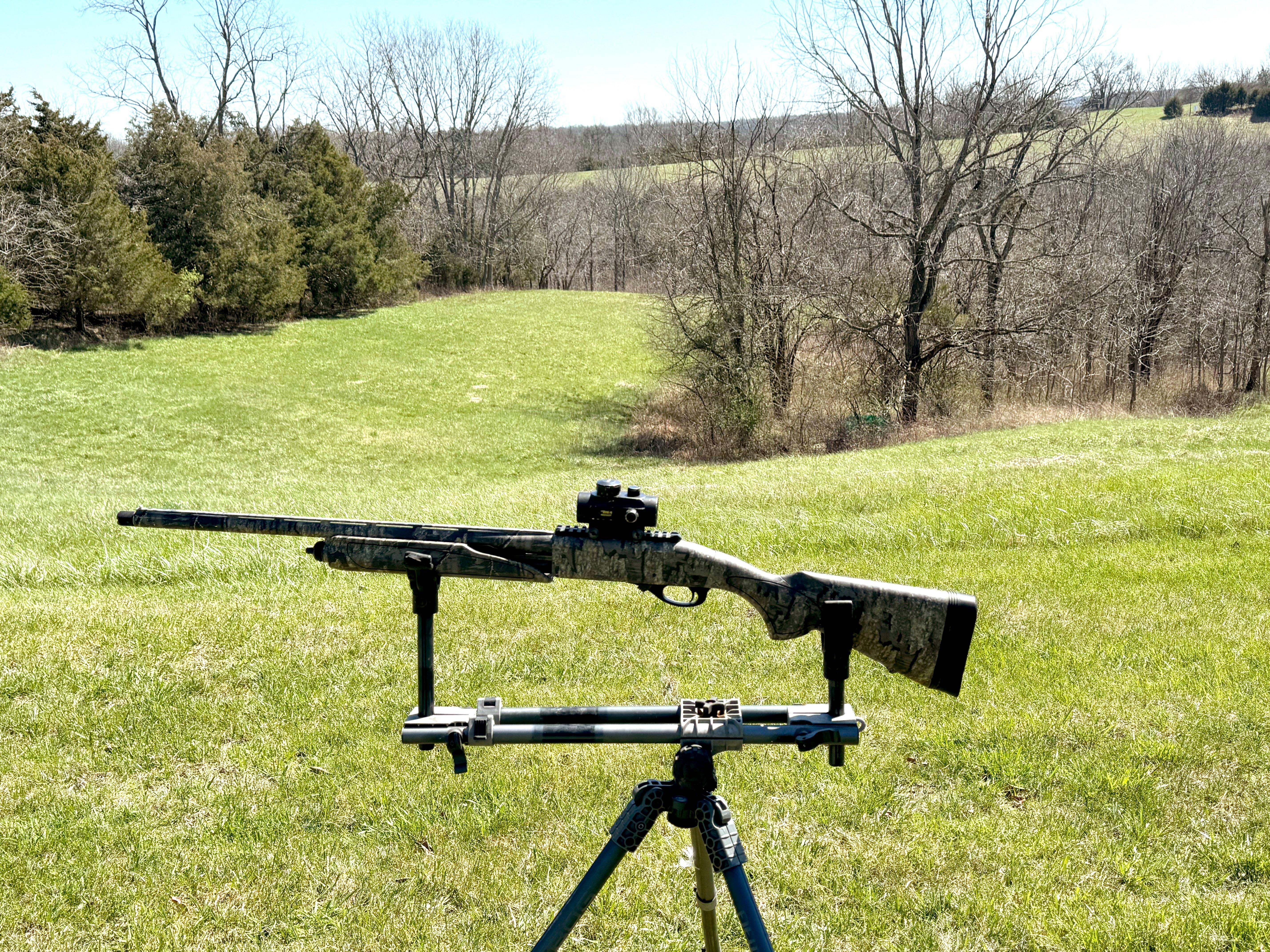
My test gun was my wife’s favorite turkey gun, a Remington Compact 870 fitted with a Carlson choke tube. Image by Michael Pendley
I shot each load at 30 yards, a good average distance for a shot at a gobbler. Will these loads kill a bird grave yard dead at longer ranges? Absolutely. How far? That’s something you will have to determine with some range time and your gun and choke combination. For some load and gun pairings, that effective range might be 40 yards, others might stretch that out to 50 or even 60 yards. The only way to know is to test your gun with different ammo at various ranges.
While I did measure the total shot count in a 10” circle for the test, that doesn’t tell the entire tale on a quality turkey load. Things to look for when choosing your turkey load include the distribution of a pattern: Is the shot uniform over the entire circle, or bunched up with holes in the pattern? Does the load open way up outside that 10” cluster? Even after a lifetime of chasing turkeys, I still get excited to squeeze the trigger. It’s easy to pull your pattern slightly in one direction or another. A nice, even spread over a wide area will put that bird down, even when you mess up a little with your shot placement.
***Don’t Miss: *THE BEST 12-GAUGE TURKEY LOADS OF 2024
Finally, it’s important to note that each of these loads had a slightly different point of impact. Because of that, I didn’t pay much attention to “shots in the vitals” on the turkey target. Instead, I flipped the targets over and traced a 9-inch circle around the densest part of the pattern for shot count. I shot each load 3 times and took an average of the 9-inch shot count for the result. Once you have settled on a load, you can adjust your aiming point to dial in the sweet spot of the pattern over the aiming point. While none of the loads were so far off that they would have completely missed a bird at 30 yards, some would have been on the very edge of the pattern. There was a full 18 inches between the center of the patterns on the outer two loads, something to remember if you plan to switch between loads during the season.
THE LOADS
Federal Premium Heavyweight TSS
1 1/2 ounces No. 9
1,100 fps
Hits in Circle: 205 One of the easiest to find TSS loads on the shelf today, Federal Premium features a FLITECONTROL FLEX wad that provides extremely tight, consistent patterns through most turkey chokes. This round has an advertised speed of 1,100 feet per second and a full-length wad to protect your gun barrel from the extra hard TSS shot. This round is available in both No. 9 and No. 7 shot size, as well as a duplex blend of the two. I tested the No. 9 version.
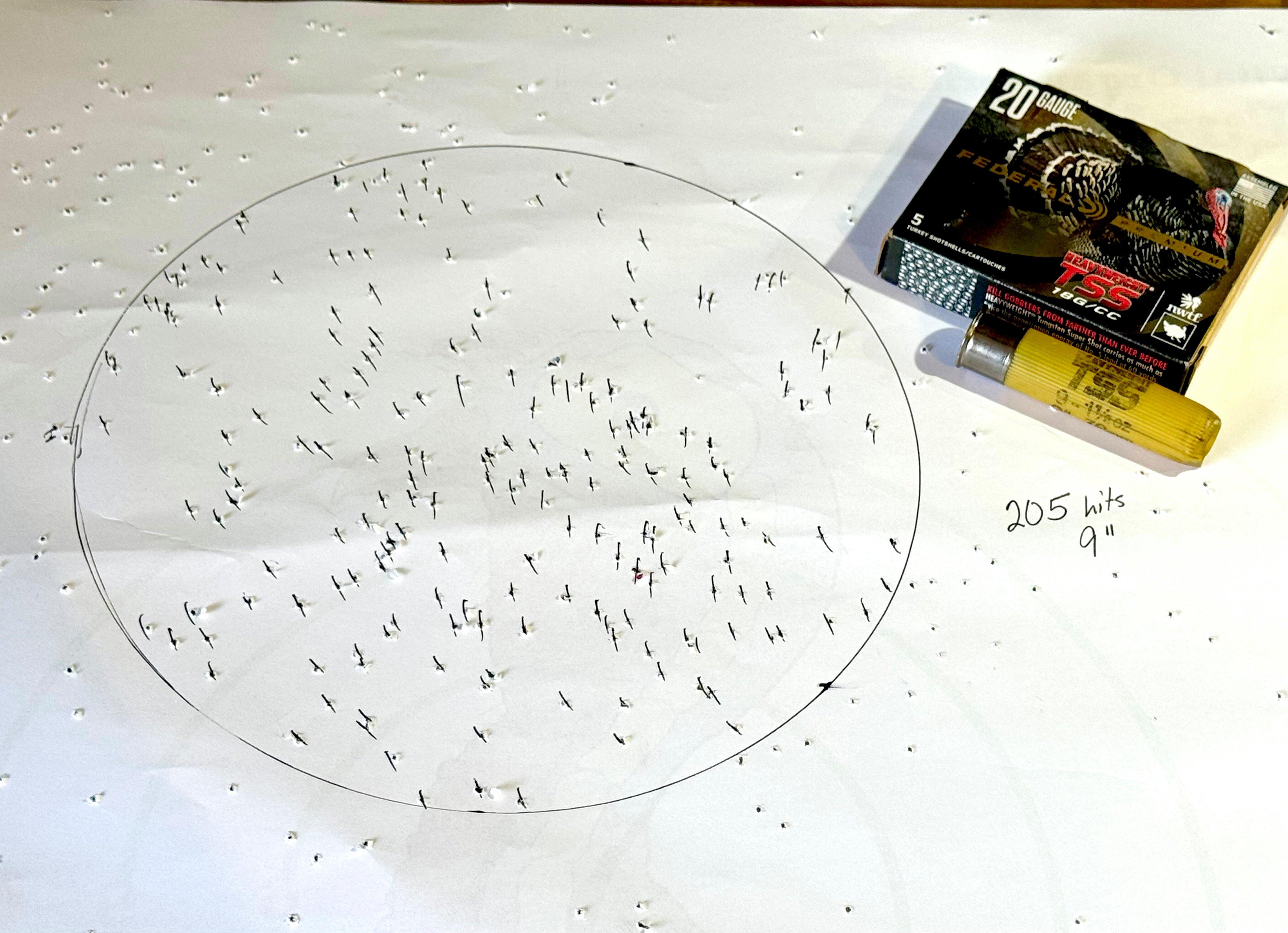
The Federal Premium Heavyweights put 205 pellets in a 9” circle. Image by Michael Pendley
Hevi-18 TSS Turkey
1½ ounces No. 9
1250 fps
Hits in Circle: 223
Hevi-Shot pioneered the heavier-than-lead shotgun shell and their latest version is the Hevi-18 Turkey. The load uses high-density 18 g/cc pellets and a friction-reducing spherical buffer to extend the effective range. Hevi-18 is one of the fastest loads I tested, pushing the 1 ½-ounce payload at 1250 feet per second. Available in both No. 7 and No. 9 shot. I tested the No. 9 version.
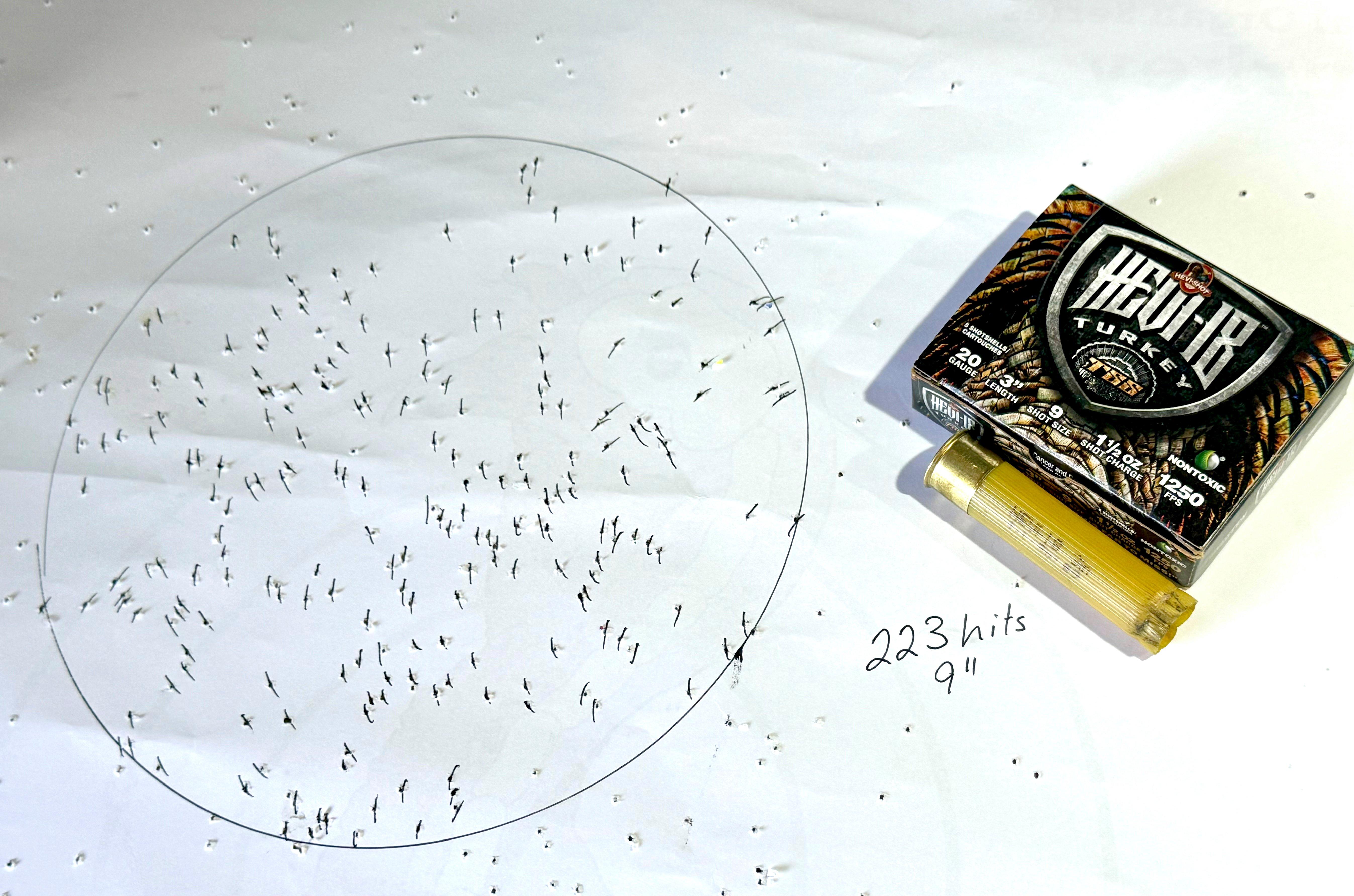
The Heavy-18 TSS turkey put 223 pellets in a 9” circle. Image by Michael Pendley
Boss Tom 18
2 ounces No. 9 or No. 7
1050 fps
Hits in Circle: 133 (No. 9); 118 (No. 7)
With only eight employees, the Michigan-based BOSS Shotshell company sells direct to consumers. Their 2-ounce turkey load sends a whopping 724 No. 9 pellets per shell down range and features a hand assembled, full length wad to protect your barrel and provide super tight patterns. The No. 7 load has 370 pellets. It’s worth noting, although the pellet count within the circle wasn’t as high with these loads as some others, the No. 9 load evenly covered the entire 19×25 target I was using.
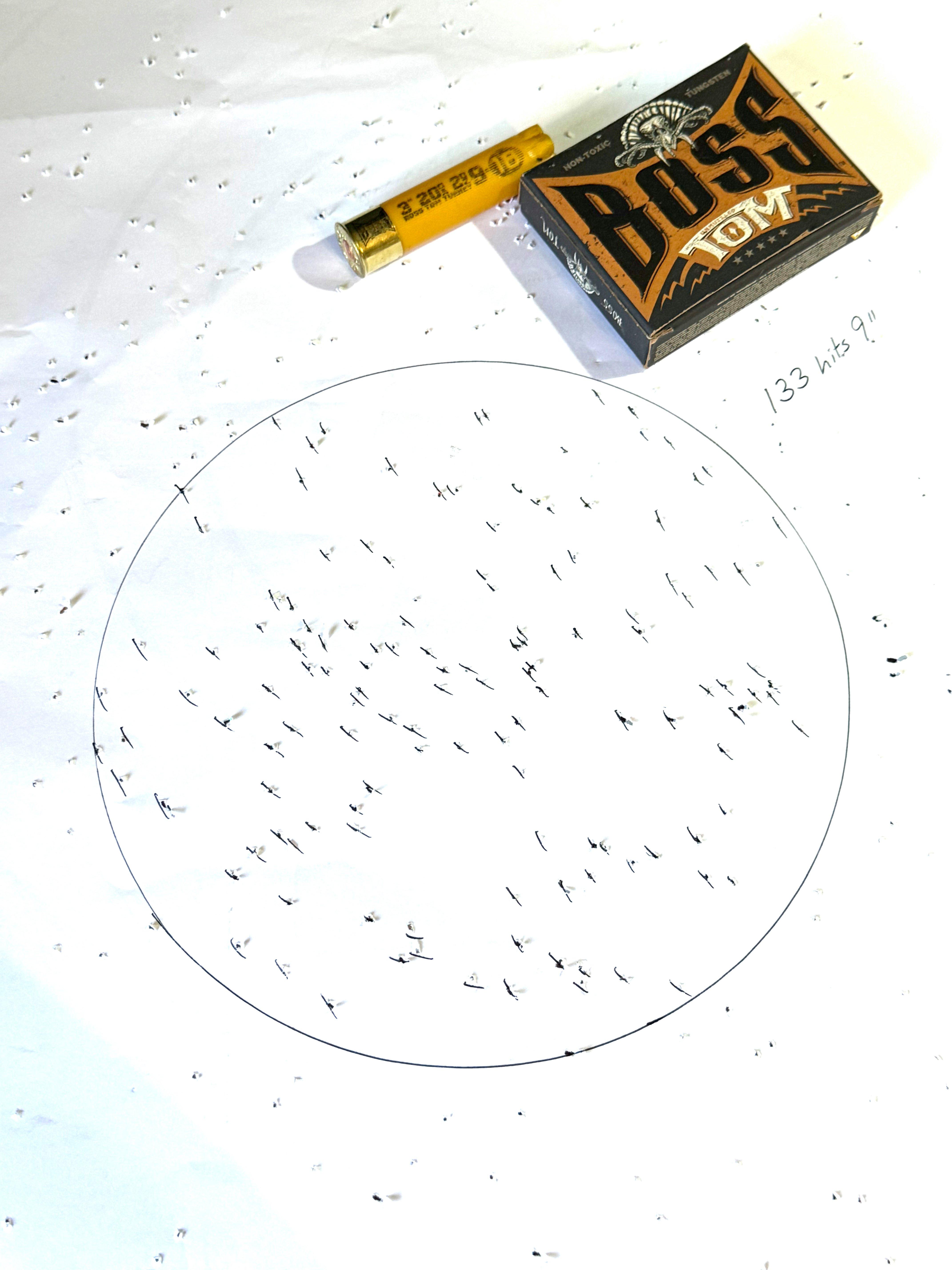
The Boss Tom 18 put 133 pellets in the circle, but pretty evenly covered the 19”x25” target. Image by Michael Pendley
Remington Premier TSS
1½ ounces No. 9
1100 fps
Hits in Circle: 174
Big Green says they tune these loads for the tightest and most consistent patterns possible, and I certainly saw good results on the range. Available in both No. 9 and No. 7 shot sizes. Like the Federal TSS loads, the Remington shells have a spur measuring ruler printed on the side of the hull. I tested the No. 9 version.
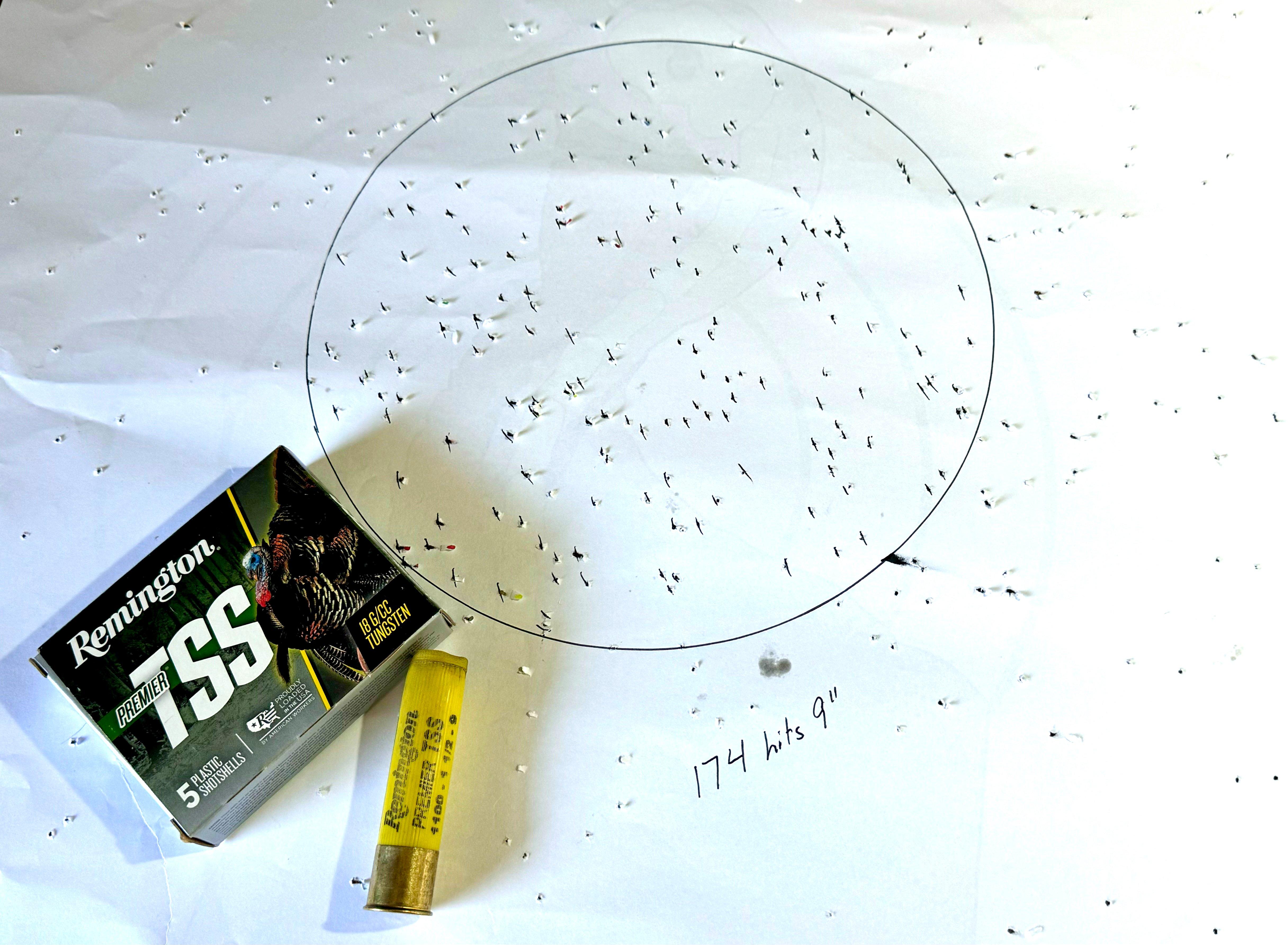
The Remington Premier TSS put 174 pellets in the circle. Image by Michael Pendley
Browning Tungsten Turkey
1½ ounces No. 7 shot
1200 fps
Hits in Circle: 112
Browning Ammunition’s TSS Tungsten Turkey load features a buffering material that helps guide the TSS shot through tight turkey chokes for improved patterns, and at higher advertised speeds. The Browning Tungsten Turkey load is available in both No. 7 and a No. 7-9 duplex load. I tested the No. 7.
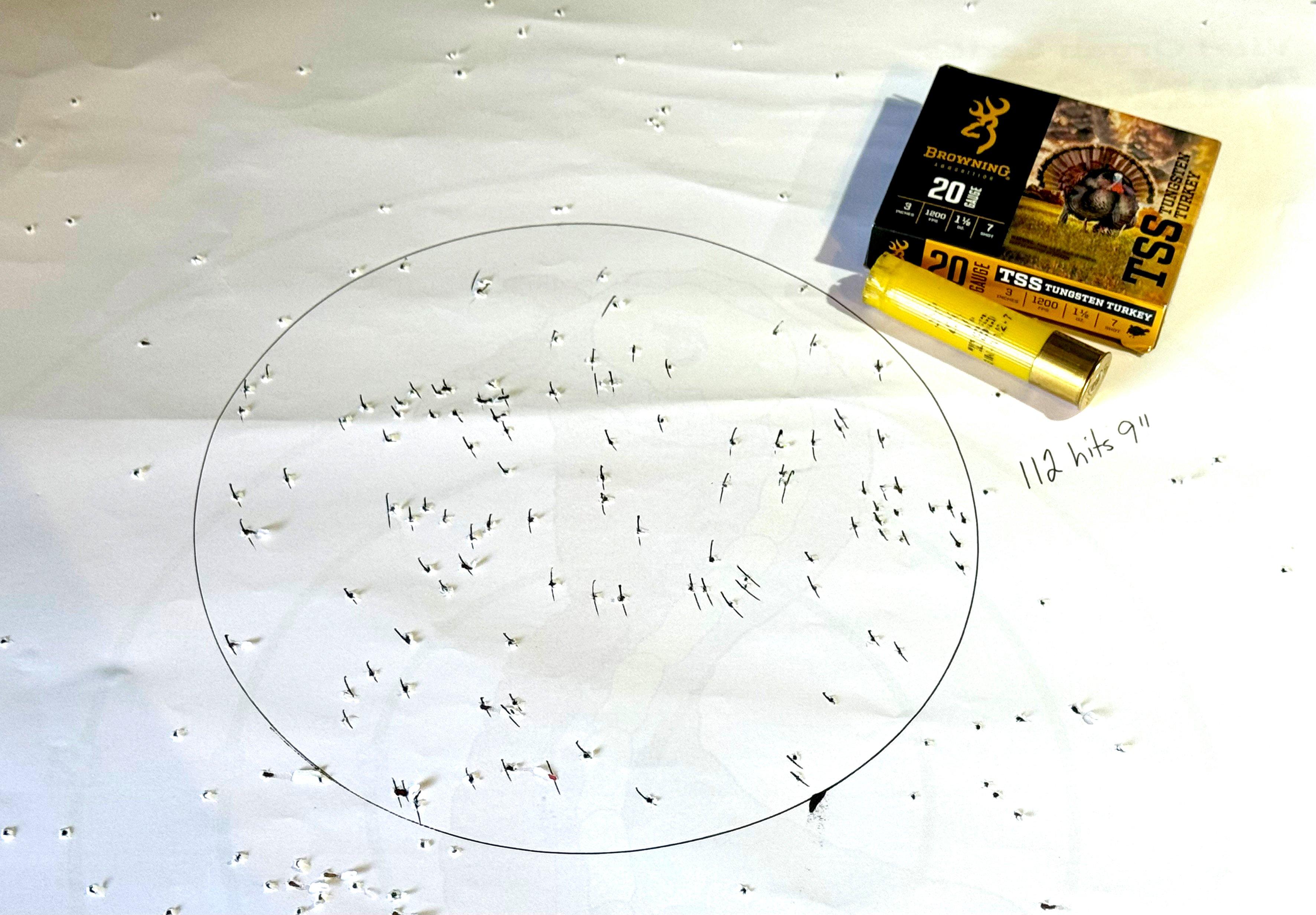
The Browning Tungsten Turkey put 112 No.7 pellets in the 9” circle. Image by Michael Pendley
Apex Turkey TSS
1⅝ ounces No. 9
1175 fps
Hits in Circle: 270
Apex shells have the second-heaviest payload of the test (590 No. 9 pellets), and pushed at the third fastest advertised speed, making for a deadly combo. Apex is a Veteran owned, Mississippi based company. Their turkey loads are available in No. 9, No. 8 and No. 7.5 shot sizes. I tested the No. 9.
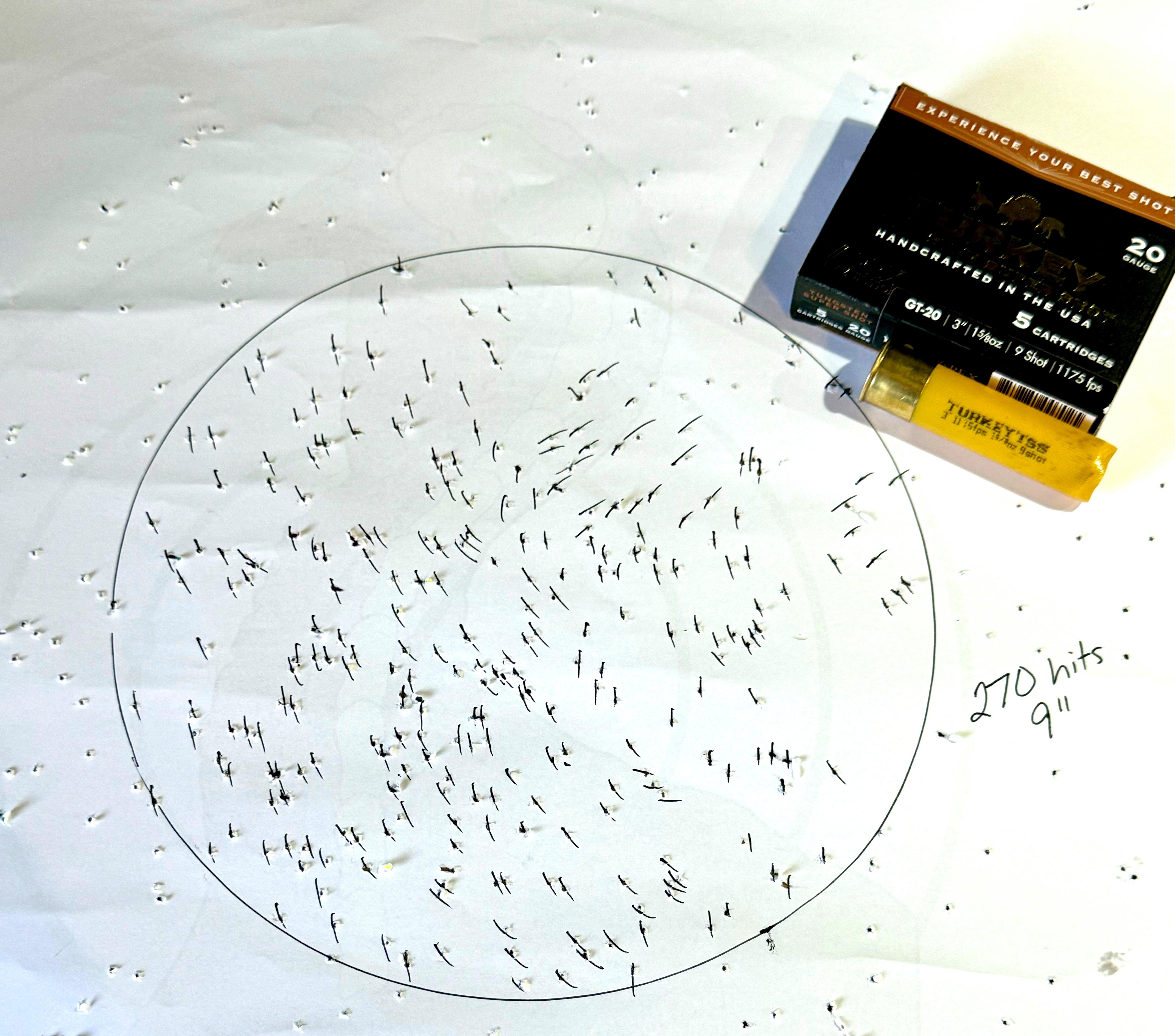
The Apex Turkey TSS put a whopping 270 pellets in a 9” circle at 30 yards. Image by Michael Pendley
Winchester Longbeard XR
1¼ ounces No. 5 or No. 6 copper-plated lead I tested the No. 5 version.
1,000 fps
Hits in Circle: 77
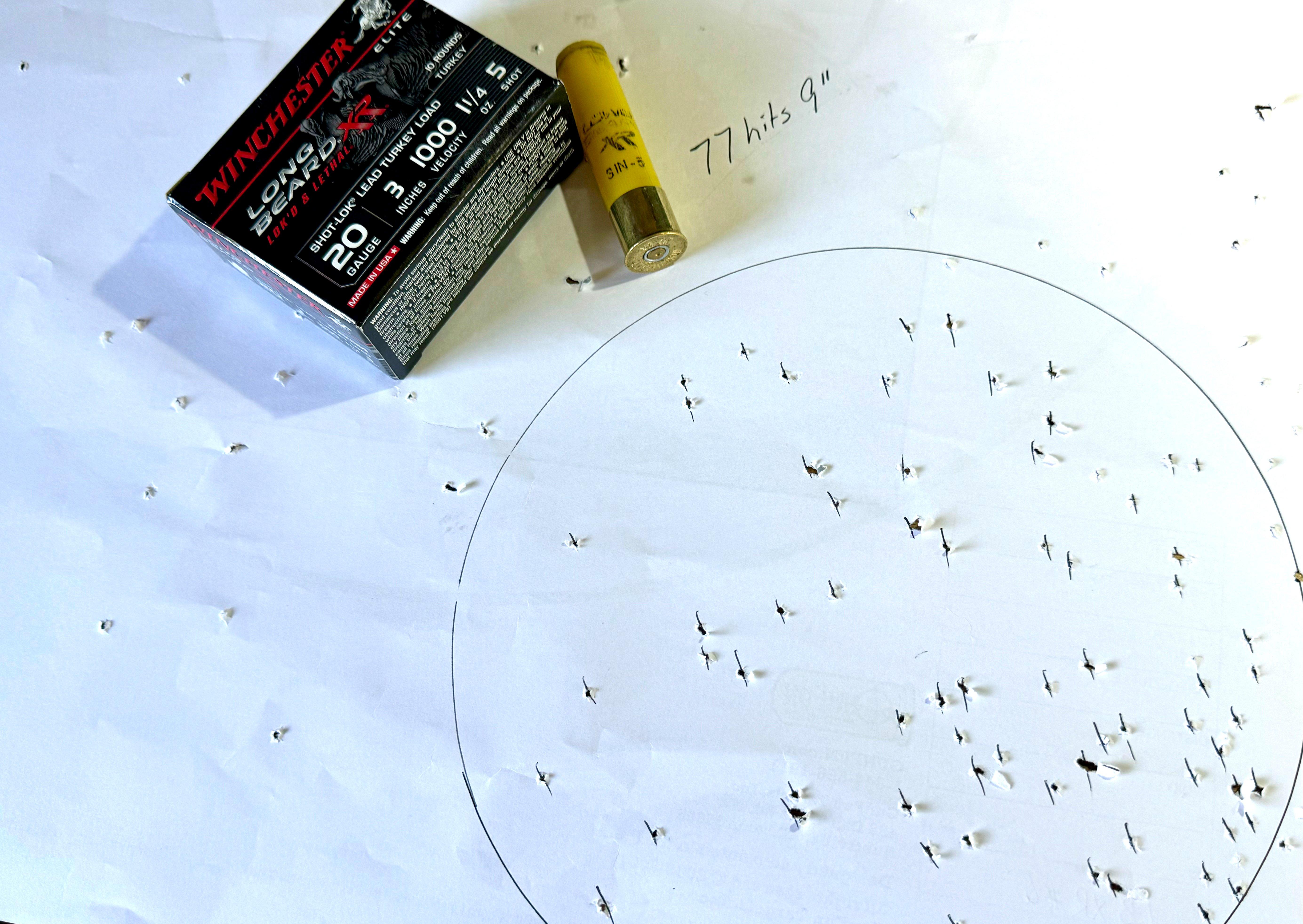
The only non-TSS load in the test, the Winchester Longboard XR is a very adequate lower cost option for the 20 gauge shooter with 77 #5 lead pellets in a 9 inch circle. Image by Michael Pendley
While TSS definitely holds a performance advantage over lead shot, there is a drawback. It is expensive. Most of the shells in this test ranged from $10 to $15 per shot. That adds up in a hurry if you put in some test time at the range and hunt several states. Winchester’s Long Beard XR uses a specialized wad and resin-packed payload of No. 5 or No. 6 lead shot that doesn’t provide quite the range of TSS, but is still a turkey killer inside 40 yards. It also costs about $2 per shot.
***Don’t Miss: *STRUT REPORT: DEEP SOUTH HUNTERS SUCCESSFUL DESPITE ROUGH WEATHER
If you’re ready for a break from 12-gauge recoil and want to start packing a lightweight 20-gauge into the turkey woods instead, these loads will allow you to drop a gobbler that’s hung up at 40 yards—and maybe a stretch farther—with confidence. Even after a full afternoon on the range with close to 30 total shots, I came away with a clear head and a shoulder that didn’t feel like I had tried to tackle a bus.
Will these shells perform the same in your shotgun? Probably not, each choke and gun combo will give different results. Get together with some of your turkey hunting buddies and buy a few boxes to share to see if one load performs better in your gun than the others.














